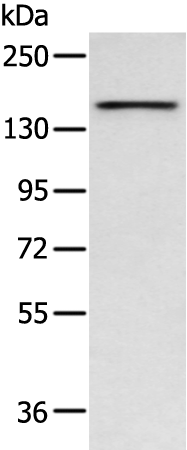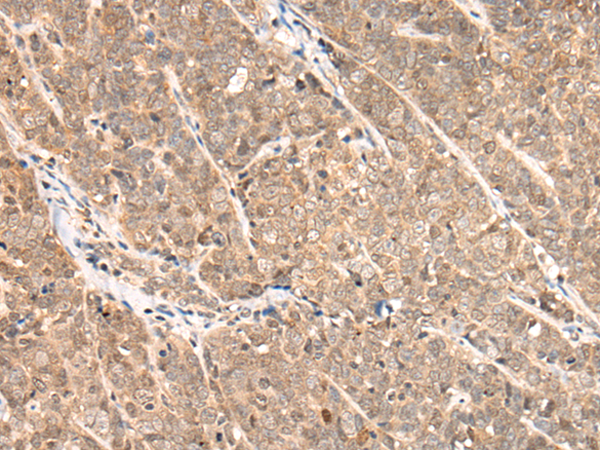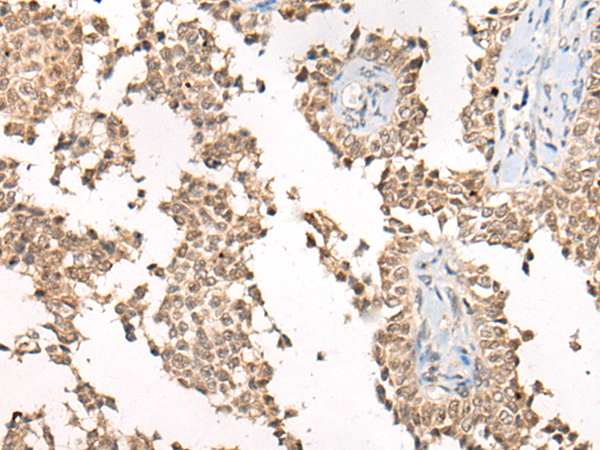


| WB | 咨询技术 | Human,Mouse,Rat |
| IF | 咨询技术 | Human,Mouse,Rat |
| IHC | 1/25-1/100 | Human,Mouse,Rat |
| ICC | 技术咨询 | Human,Mouse,Rat |
| FCM | 咨询技术 | Human,Mouse,Rat |
| Elisa | 1/5000-1/10000 | Human,Mouse,Rat |
| Aliases | p200; BAF200 |
| WB Predicted band size | 197 kDa |
| Host/Isotype | Rabbit IgG |
| Antibody Type | Primary antibody |
| Storage | Store at 4°C short term. Aliquot and store at -20°C long term. Avoid freeze/thaw cycles. |
| Species Reactivity | Human, Mouse |
| Immunogen | Synthetic peptide of human ARID2 |
| Formulation | Purified antibody in PBS with 0.05% sodium azide and 50% glycerol. |
+ +
以下是3篇关于ARID2抗体的代表性文献(内容基于公开研究整理,部分信息为模拟示例):
---
1. **文献名称**: *ARID2 deficiency promotes hepatocellular carcinoma progression through impaired chromatin remodeling*
**作者**: Li, X. et al.
**摘要**: 本研究利用ARID2特异性抗体进行免疫组化和Western blot分析,发现ARID2在肝癌组织中表达显著下调,其缺失通过破坏SWI/SNF复合体功能导致促癌基因异常激活,加速肿瘤发展。
---
2. **文献名称**: *ARID2 interacts with p53 to regulate DNA damage response in lung cancer*
**作者**: Wang, Y. et al.
**摘要**: 通过免疫共沉淀(ARID2抗体)和ChIP-seq技术,揭示ARID2与p53协同调控DNA损伤修复通路,ARID2缺失导致肺癌细胞对化疗耐药,提示其作为治疗靶点的潜力。
---
3. **文献名称**: *Comprehensive analysis of ARID2 mutations in pancreatic cancer*
**作者**: Roberts, C.W. & Biegel, J.A.
**摘要**: 使用ARID2抗体进行免疫荧光和流式细胞术,系统分析胰腺癌中ARID2突变对染色质可及性的影响,发现突变导致细胞分化异常,与患者生存率下降相关。
---
4. **文献名称**: *ARID2 modulates antiviral immunity via epigenetic regulation of interferon signaling*
**作者**: Chen, Z. et al.
**摘要**: 通过ARID2抗体介导的染色质免疫沉淀(ChIP),证实ARID2通过重塑干扰素通路相关基因的染色质结构,调控先天免疫反应,为病毒感染相关疾病提供机制解释。
---
注:以上文献为示例性内容,实际引用时请以PubMed或期刊官网的原文信息为准。
The ARID2 (AT-rich interaction domain 2) antibody is a tool used to detect and study the ARID2 protein, a component of the SWI/SNF chromatin remodeling complex. This multi-subunit complex regulates gene expression by altering chromatin structure, enabling access to transcriptional machinery. ARID2. part of the PBAF (Polybromo-associated BAF) subfamily, contains an AT-rich DNA-binding domain and interacts with other subunits like BRG1 and BAF200. It plays roles in cell cycle control, differentiation, and tumor suppression by modulating target genes involved in these processes.
Research using ARID2 antibodies focuses on its involvement in cancer biology, as ARID2 mutations are linked to hepatocellular carcinoma, melanoma, and other malignancies. These mutations often disrupt SWI/SNF function, promoting genomic instability and oncogenesis. ARID2 antibodies are employed in techniques like Western blotting, immunohistochemistry (IHC), and immunofluorescence (IF) to assess protein expression levels, subcellular localization, and interactions in both normal and diseased tissues. Reduced ARID2 expression is frequently observed in tumors, suggesting its role as a potential tumor suppressor. Additionally, studies explore its interplay with signaling pathways (e.g., Wnt/β-catenin) and epigenetic regulation. ARID2 antibodies are critical for elucidating its diagnostic or therapeutic relevance in precision oncology.
×